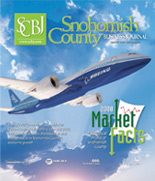 |
Snohomish County Business Journal/Dave Clark
(click to enlarge) |
| An Ichi Roll with imitation crab salad, avacado, cucumber and unagi sauce, available at Sushi Revolution in Tacoma. |
 |
Snohomish County Business Journal/Dave Clark
(click to enlarge) |
| A Lion Roll with shrimp tempura, krab salad and cucumber topped with seared salmon, unagi sauce and Japanese mayo, available at Sushi Revolution in Tacoma. |
 |
Snohomish County Business Journal/Dave Clark
(click to enlarge) |
| A Spider Roll with deep-fried soft-shell crab, cucumber, krab meat and avocado topped with spicy mayo sauce and fish eggs; available at Sakura Japanese Steak House & Sushi Bar in Burlington. |
 |
Snohomish County Business Journal/Dave Clark
(click to enlarge) |
| A Rainbow Roll made with imitation crab meat, cucumber and avocado wrapped with tuna, salmon, white fish and yellow tail; available at Sakura Japanese Steak House & Sushi Bar in Burlington. |
 |
Snohomish County Business Journal/Dave Clark
(click to enlarge) |
| Seared Tuna Tataki, available at Sushi Belt & Roll in Marysville. |
 |
Snohomish County Business Journal/Dave Clark
(click to enlarge) |
| Senior Chef/Manager Young J. Byun (left) sits with Owner Sinae Bae at their new restaurant, Belt Sushi & Roll in Marysville. |
 |
Snohomish County Business Journal/Dave Clark
(click to enlarge) |
| A King Kong Roll with shrimp tempura, spicy tuna, cucumber and eel, available at Sushi Belt & Roll in Marysville. |
 |
Snohomish County Business Journal/Dave Clark
(click to enlarge) |
| Sushi Revolution in Tacoma offers sushi stylings as modern as the restaurant’s interior design. |
|
| |
ADVERTISEMENT
|
| |
 |
|
|
|
Kaiten-zushi (also called sushi-go-round in Japan or sushi train in Australia) has been around for over half a century. It was invented by Yoshiaki Shiraishi, a sushi chef operating a small bar in Japan during the late 1940’s. Plagued by constant staff shortages, he was inspired watching bottles being processed during a tour to a local beer factory. Shiraishi opened the first kaiten-zushi restaurant in 1958, which quickly exploded to as many as 240 locations across Japan.
“Kaiten was born out of the recession in Japan,” said Steve Rosen, co-founder of Blue C Sushi. “He was trying to ask himself, ‘How do I get people out of their homes and into my restaurant that has a different labor model so I can survive in a recession?’”
The conveyor belt allows restaurants to serve large amounts of people quickly, something Rosen said was revolutionary at the time. While a chef at a more traditional sushi bar can comfortably service about nine customers at a time, a kaiten restaurant can serve 70 or more people with just four or five employees. Yet the real expertise, he said, is in the ability to cut fish.
“If I cut the fish, I can teach people how to roll a roll or prepare nigiri,” said Rosen. “[Shiraishi] compartmentalized the work, training a lot of people to do things most sushi restaurants rely on a high level of expertise to do.”
Some kaiten bars have been adapted to serve Chinese dim sum. Other modern variations include those serving sushi on a toy train winding around a track, or on small boats floating along streams of flowing water.
To reduce waste and help ensure freshness, some kaiten bars now utilize a touch screen display customers use to order sushi that is delivered using a belt stretching from the kitchen to their table.
Restaurants choose from a variety of methods including stickers, barcodes and microchips to keep track of how long a dish has been sitting on the belt. More advanced systems will discard the expired food automatically, allowing workers to spend more time serving their guests. At Blue C, Rosen and Co-founder James Allard worked with Microsoft, Seattle-based Kikata, and Intermec in Everett to develop an RFID system that could not only tell them how long a plate was sitting on the belt, but also keep track of what dishes were being placed on the belt. This allows the company to customize their belts’ variety to the preferences of the neighborhoods they serve.
At the time of Shiraishi’s death in 2001, only 11 of his original restaurants were still doing business in Osaka and the greater Kansai region. The kaiten trend itself had grown to a reported $2.1-billion industry, made up of about 2,700 conveyor belt restaurants within the country and many more spread across the globe.
The popularity of kaiten has steadily grown throughout Asia, Europe and North America. A British restaurant chain named “YO! Sushi” has helped bring kaiten dining to locations in the Middle East including Dubai, Bahrain and Kuwait, as well as other countries such as Russia, Ireland and Malaysia. |
| |
| |
| Related Stories |
• Intermec to lay off 150 1/30/09
|
| |
|
|
Published:
Friday, January 30, 2009
Conveyor belt restaurants winding their way north as the popular sushi trend grows in the Seattle area
By Dave Clark
SCBJ Assistant Editor
Seafood has been an important part of Sinae Bae’s life since she was raised in Pusan, Korea. Bae’s mother, Sang Nam Bae, woke up early each morning and put on a wet suit to dive for clams and other shell fish she could use to cook their daily meals. Bae comes from a family of entrepreneurs with over 30 years of experience, having owned cafes, a sports bar, a seafood market, sushi bars and a restaurant serving Korean cuisine.
Her parents made their way to Boston, where they retired in 2004. While passing through Washington on a trip across the country, Bae’s father, Byung Pyo Bae, came across a restaurant that was serving a wide variety of cooked and raw sushi dishes traveling on a long conveyor belt circling around the room. He could eat as soon as he sat down and the cost of each dish corresponded to the color of the plate it was served on. Byung heard of kaiten-zushi (conveyor belt sushi) in Japan and Asia, but he had never seen or visited one before. He fell in love with the concept and in 2005 his family took ownership of Sushi Yama in downtown Bellevue.
Bae graduated from an East Coast college in 2007 and returned to Washington with the idea of starting up her own kaiten restaurant for people who want to experience sushi for the first time. She opened Belt Sushi & Roll in December on the corner of a mini mall in front of Best Buy and Target in Marysville. To celebrate, the restaurant offered every dish on their menu for $1 each during a special promotion in January. Bae said more events will be coming soon.
“We are very happy to be here,” she said. “People come in and say ‘I’m so happy there is sushi in our town; I don’t have to travel to Bellevue or Lynnwood or Seattle.’”
The menu features nigiri (small cuts of fish on top of hand-formed clumps of rice) and sushi rolls starting at $1 per plate. Each dish has been specially tailored by Senior Chef/Manager Young J. Byun with sauces and seasonings to please sushi connoisseurs and novices alike. Bae wanted to avoid copying other kaiten bars in the area, she said, and designed her restaurant to offer fresh ideas about traditional Asian cuisine.
In the near future, diners will be able to purchase decorative hand-made chop sticks, as well as kits that will help them learn to make sushi at home. Bae’s ultimate goal, she said, is to encourage people to try more ethnic foods and include them in their diet.
“I consider food a cultural bridge,” said Bae. “If people have a certain bias or a certain concept of a culture, and they learn that they really like its food, they tend to be more accepting and take more of an interest in that culture. It may not cure diseases or bring world peace, but it’s a step forward I think.”
Sushi’s Northwest explosion
Word of mouth has spread quickly about Belt Sushi & Roll, which joins a host of new restaurants introducing the growing sushi trend to communities along the I-5 corridor. Four months ago, Alex Kim was the first person to open a conveyor belt restaurant between Lynnwood and the Canadian border. Sakura Japanese Steak House & Sushi Bar in Burlington offers fanciful hibachi (a.k.a. teppanyaki) grilling combined with a sushi bar serving high-quality nigiri and rolls. Kim’s business is booming, and it’s not uncommon to see customers lined up to catch a fiery performance by one of his talented chefs.
Sam Min, who was until recently working for The Loft in Bellingham, decided to open his own conveyor belt sushi bar when the Japanese restaurant burned down along with other Delft Square businesses in June. Min and his wife, Judy, are opening Kuru Kuru Sushi this month at 11 Bellwether Way, Suite 101, near the Hotel Bellwether in Bellingham.
But the wave of new kaiten restaurants doesn’t end there. As misfortune would have it, when Bae she set out to open her new restaurant, another restaurateur named Kwangsook Kim was busy preparing her own kaiten sushi bar for its Marysville debut. Paradise Sushi & Grill is tentatively scheduled for a March opening in a new mini mall facing the north wall of Best Buy — a stone’s throw away from Belt Sushi & Roll. Kwangsook owns 17 kaiten restaurants in Korea, she said, most of which are located in Seoul, the nation’s capital. Kwangsook hopes to open as many as 12 new locations in the greater Seattle area before focusing her attention on future expansion in Ohio and San Francisco, California. Apparently, neither Kwangsook nor Bae knew about each others’ business plans until they were already in full swing.
Sushi Land Marinepolis USA, the Northwest’s oldest conveyor belt sushi chain with 10 restaurants established in Washington and Oregon since 1991, is opening the doors to its 11th location this month at 18500 33rd Ave near the Alderwood Mall in Lynnwood. Their parent company has established over 100 kaiten sushi restaurants in Western Japan, along with other chains offering higher-end sushi non-sushi dishes. Many of the company’s menus are “all 100 yen” (about $1 per plate).
Home Office Manager Timothy Reimier said the company plans to open another 10 locations within the next two years, in the Northwest and in other parts along the West Coast.
“This current recession is an opportunity,” said Reimier. “Already, I’ve heard that McDonalds has reported increased sales by a substantial margin over last year. This proves that in hard economic times, people shun the expensive establishments and stick to more affordable ones. We have seen many ‘copycat’ ‘mom and pop’ stores over the years, but so far, no one has come close to being able to reproduce what we are doing.”
Sushi Land’s Lynnwood restaurant will be the company’s second location to come into close quarters with Blue C Sushi, another kaiten chain trying to make a name for itself inWashington. Co-founders Steve Rosen and James Allard have opened four locations since introducing Seattle’s Fremont neighborhood to the modernly-styled kaiten brand in 2003. Blue C’s newest location will be open at the end of February, next to The Cheesecake Factory in Bellevue Square.
Despite the proximity, Rosen said his company attracts a different kind of consumer than restaurants like Sushi Land: one that is willing to spend a little more money for higher-quality ingredients and more comfortable décor.
“It’s an age old tradition for restaurants to go right next door to each other and compete on price,” he said. “Ultimately, a competition based solely on price naturally ends up forcing business owners to sacrifice quality — quality of the fish, quality of the rice, and quality of staffing and service — and this caused the kaiten industry in Japan to take a big downturn.”
“A group in Japan recently told us their best performing restaurants were those catering to a quality conscious clientele, because people like the kaiten style, but they care about quality too,” Rosen added. “We believe as people in the U.S. become more sophisticated in their understanding of sushi, serving a quality product will be essential.”
Rosen and Allard visit Japan every year with business partner Shinichi Miura, Blue C Sushi’s executive chef. They record many hours of video while traveling so it can be projected on the wall at their restaurants when they return, giving diners a leisurely tour of Japan’s neighborhoods and a sense of what new things are happening in the country today. He believes in time people will see more Japanese trends become popular in the United States.
|







